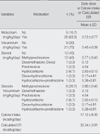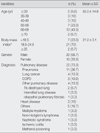Abstract
Purpose
The purpose of this study was to identify muscle atrophy in critically ill patients on ventilators. A comparison was made between limb circumferences and muscle areas on the day of admission to an intensive care unit (ICU) and on the 8th day after admission.
Methods
The data were collected from 30 critically ill patients using ventilators at S hospital ICU in Seoul during the period from October 2005 to April 2006. Limb circumferences and skinfold thickness were measured on the day of admission and on the 8th day after admission to the ICU. Limb circumferences and skinfold thickness were measured on the right mid-arm, right mid-thigh, and right mid-calf using a measuring tape and a skinfold calipers. Limb muscle areas were calculated by an equation after measuring limb circumferences and skinfold thickness. The data were analyzed by paired t-test and independent t-test.
Results
1) Mid-arm circumference, mid-thigh circumference and mid-calf circumference on the 8th day after admission to the ICU were significantly less than those on the day of admission to the ICU, 2) Mid-arm muscle area, mid-thigh muscle area and mid-calf muscle area on the 8th day after admission to the ICU were significantly less than those on the day of admission to the ICU, 3) Steroid and vecuronium medication didn't affect changes in limb circumferences (mid-arm, mid-thigh, mid-calf) and muscle areas (mid-arm, mid-thigh, mid-calf) on the 8th day after admission to the ICU compared to the day of admission.
Figures and Tables
Table 2
Mean Daily Dose of Midazolam, Vecuronium, and/or Steroid, and Mean Daily Calorie Intake (N=30)

Table 3
Limb Circumferences of Critically Ill Patients using Ventilators on the 8th Day After Admission to Intensive Care Unit (N=30)

References
1. Akima H, Kuno S, Suzuki Y, Gunji A, Fukunaga T. Effects of 20 days of bed rest on physiological cross-sectional area of human thigh and leg muscles evaluated by magnetic resonance imaging. Journal of Gravitional Physiology. 1997. 4:S15–S21.
2. Arnold J, Campbell IT, Samuels TA, Devlin JC, Green CJ, Hipkin LJ, et al. Increased whole body protein breakdown predominates over increased whole body protein synthesis in multiple organ failure. Clinical Science. 1993. 84:655–661.
3. Chae YR, Choe MA. Effect of a decreased activity following THRA on circumference, volume and strength of normal and operated lower extremities. Journal of Korean Academy of Nursing. 1994. 24:115–128.
4. Choe MA. Changes in skinfold thickness, circumference and muscle strength of extremities of hospitalized patients. The Seoul Journal of Nursing. 1991. 5:23–34.
5. Choe MA. Muscle atrophy and exercise. 1999. 02. Paper presented at the workshop of the Korean Society of Sports Medicine, Seoul.
6. Choe MA, Chi JG. Effect of periodic weight support on type 1 muscle of developing suspended rats: Animal experiment for nursing intervention of muscle atrophy in children. Journal of Korean Academy of Nursing. 1993. 23:207–223.
7. Choe MA, Choi JA, Shin GS. Effect of regular exercise during dexamethasone injection on the body weight, weight of hindlimb muscle and adrenal gland in young rats. Journal of Korean Academy of Nursing. 1997. 27:510–519.
8. Cohen J. Statistical power analysis for the behavior science. 1988. 2nd ed. Hillsdale, NJ: Lawrence Erlbaum Association Pub.
9. Dekhuijzen PN, Gayan-Ramirez G, Bisschop A, deBock V, Dom R, Bouillon R, et al. Rat diaphragm contractility and histopathology are affected differently by low dose treatment with methylprednisolone and deflazacort. The European Respiratory Journal. 1995. 8:824–830.
10. Frank LM, Detchans LW. Skeletal muscle pathology. 1992. 2nd ed. Edinburgh, NY: Churchill Livingstone.
11. Helliwell TR, Wilkinson A, Griffiths RD, McClelland P, Palmer TE, Bone JM. Muscle fibre atrophy in critically ill patients is associated with the loss of myosin filaments and the presence of lysosomal enzymes and ubiquitin. Neuropathology and Applied Neurobiology. 1998. 24:507–517.
12. Hong SB. Survey of patients using mechanical ventilators in intensive care unit in Korea. 2003. Paper presented at the meeting of the Korean Academy of Tuberculosis and Respiratory Diseases, Seoul.
13. Kasper CE, Talbot LA, Gaines JM. Skeletal muscle damage and recovery. AACN Clinical Issues. 2002. 13:237–247.
14. Kim YJ. Midazolam in intensive care unit. 2001. 11. Paper presented at the meeting of the Korean Society for Anesthetic Pharmacology, Seoul.
15. Koh YS. Survey of patients using mechanical ventilators over 72 hr in intensive care unit in Korea. 2003. Paper presented at the meeting of the Korean Academy of Tuberculosis and Respiratory Diseases, Seoul.
16. Laaban JP, Kouchakji B, Dore MF, Orvoen-Frija E, David P, Rochemaure J. Nutritional status of patients with chronic obstructive pulmonary disease and acute respiratory failure. Chest. 1993. 103:1362–1368.
17. Moukas M, Vassiliou MP, Amyqdalou A, Mandraqos C, Takis F, Behraakis PK. Muscular mass assessed by ultrasonography after administration of low-dose corticosteroids and muscle relaxants in critically ill hemiplegic patients. Clinical Nutrition. 2002. 21:297–302.
18. Nava S, Gayan-Ramirez G, Rollier H, Bisschop A, Dom R, Bock V, et al. Effects of acute steroid administration on ventilatory and peripheral muscles in rats. American Journal of Respiratory and Critical Care Medicine. 1996. 153:1888–1896.
19. Park EK, Lim HS, Lee JH. Degree of enteral tube feeding in the intensive care unit and change in nutritional status. Journal of the Korean Dietetic Association. 2001. 7:217–226.
20. Reid CL, Campbell IT, Little RA. Muscle wasting and energy balance in critical illness. Clinical Nutrition. 2004. 23:273–280.
21. Song JW, Oh YM, Sim TS, Im CM, Lee SD, Kim WS, et al. Cause disease and result of mechanical ventilator therapy in medical intensive care unit of a university hospital. 2003. Paper presented at the meeting of the Korean Academy of Tuberculosis and Respiratory Diseases, Seoul.
22. Yoon BC, Lee MH, Kim NS, Hong HJ, Yu BK. Comparison of muscle atrophy induced by cast fixation, denervation and suspension of rat hindlimb. The Journal of Korean Society of Physical Therapy. 2001. 13:665–675.




 PDF
PDF ePub
ePub Citation
Citation Print
Print





 XML Download
XML Download